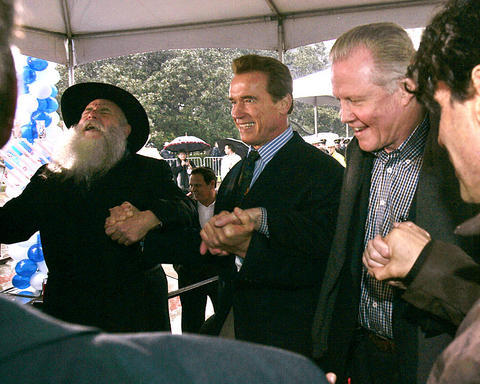California Governor Arnold Schwarzenegger will ask voters to increase cigarette taxes to expand healthcare to the uninsured, the first increase he has supported since taking office on a vow to oppose new taxes.
The increase is part of an agreement Schwarzenegger struck with Assembly Democrats, his press secretary Aaron McLear said. The money from the tax would replace Schwarzenegger's proposal to lease the state's lottery to finance universal healthcare, something Democrats opposed.
Schwarzenegger and the Democrats had been at odds over key portions of his proposal to insure almost 7 million Californians who cannot afford coverage. He vetoed their version of universal healthcare in September, saying businesses shouldered too much of the cost. They had already agreed to put any final agreement before voters in order to bypass Republican lawmakers, who can block the passage because taxes need a two-thirds majority vote.

PHOTO: AP
"We've agreed to include the tobacco tax as part of the financing mechanism that will go before voters," McLear said in an e-mail. "We're still negotiating the size and terms."
Last month, Democrats said they wanted to raise tax on cigarettes to US$2.87 from US$0.87 per pack. Schwarzenegger has rejected all calls for tax increases since he took office four years ago.
Last year California voters rejected a ballot measure calling for a US$2.60 per pack tax increase on cigarettes after tobacco companies such as Altria Group Inc, parent of Philip Morris and the biggest cigarette maker, and Reynolds American Inc, parent of the second-largest US cigarette producer, financed a US$80 million campaign against the measure.
Under the agreement, lawmakers would divorce the funding mechanisms of a universal healthcare program from the policy portions. Lawmakers would need to pass a bill putting the funding portion, such as the tax increase, on the ballot. They would also need to approve the policy portions in a separate bill.
The new plan would require businesses -- depending upon their size -- to spend between 1 percent and 6.5 percent of their payroll costs on healthcare or pay the same amount into a state insurance fund. Schwarzenegger had initially said businesses should not pay more than 4 percent.
The Assembly, controlled by the Democrats, has scheduled a vote on the plan as early as today. In the Senate, also controlled by the Democrats, President Pro Tem Don Perata has said he would not bring the measure up for a vote until after Schwarzenegger details his budget for the fiscal year that starts July. 1.
Schwarzenegger said on Friday that the state's budget deficit had swelled to as much as US$14 billion and that he would declare a fiscal emergency next month in order to make midyear budget corrections.

MORE VISITORS: The Tourism Administration said that it is seeing positive prospects in its efforts to expand the tourism market in North America and Europe Taiwan has been ranked as the cheapest place in the world to travel to this year, based on a list recommended by NerdWallet. The San Francisco-based personal finance company said that Taiwan topped the list of 16 nations it chose for budget travelers because US tourists do not need visas and travelers can easily have a good meal for less than US$10. A bus ride in Taipei costs just under US$0.50, while subway rides start at US$0.60, the firm said, adding that public transportation in Taiwan is easy to navigate. The firm also called Taiwan a “food lover’s paradise,” citing inexpensive breakfast stalls

TRADE: A mandatory declaration of origin for manufactured goods bound for the US is to take effect on May 7 to block China from exploiting Taiwan’s trade channels All products manufactured in Taiwan and exported to the US must include a signed declaration of origin starting on May 7, the Bureau of Foreign Trade announced yesterday. US President Donald Trump on April 2 imposed a 32 percent tariff on imports from Taiwan, but one week later announced a 90-day pause on its implementation. However, a universal 10 percent tariff was immediately applied to most imports from around the world. On April 12, the Trump administration further exempted computers, smartphones and semiconductors from the new tariffs. In response, President William Lai’s (賴清德) administration has introduced a series of countermeasures to support affected

CROSS-STRAIT: The vast majority of Taiwanese support maintaining the ‘status quo,’ while concern is rising about Beijing’s influence operations More than eight out of 10 Taiwanese reject Beijing’s “one country, two systems” framework for cross-strait relations, according to a survey released by the Mainland Affairs Council (MAC) on Thursday. The MAC’s latest quarterly survey found that 84.4 percent of respondents opposed Beijing’s “one country, two systems” formula for handling cross-strait relations — a figure consistent with past polling. Over the past three years, opposition to the framework has remained high, ranging from a low of 83.6 percent in April 2023 to a peak of 89.6 percent in April last year. In the most recent poll, 82.5 percent also rejected China’s

PLUGGING HOLES: The amendments would bring the legislation in line with systems found in other countries such as Japan and the US, Legislator Chen Kuan-ting said Democratic Progressive Party (DPP) Legislator Chen Kuan-ting (陳冠廷) has proposed amending national security legislation amid a spate of espionage cases. Potential gaps in security vetting procedures for personnel with access to sensitive information prompted him to propose the amendments, which would introduce changes to Article 14 of the Classified National Security Information Protection Act (國家機密保護法), Chen said yesterday. The proposal, which aims to enhance interagency vetting procedures and reduce the risk of classified information leaks, would establish a comprehensive security clearance system in Taiwan, he said. The amendment would require character and loyalty checks for civil servants and intelligence personnel prior to